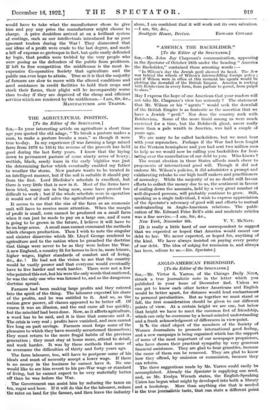F‘ AMERICA THE BACKSLIDER." [To the Editor of the SPECTATOR.]
SIR,—Mr. John Jay Chapman's communication, appearing in the Spectator of October 28th under the heading "America the Backslider," contained these arresting words :—
"In Wilson's day the Jewish peril showed its head. The Jew was behind the wheels of Wilson's intermeddling foreign policy ; and if Wilson were in office at this moment his agents would be plotting the downfall of the British Empire. America is rocking
with Bolshevism in every form, from parlour to garret, from pulpit to slum."
May I express the hope of one American that your readers will not take Mr. Chapman's view too seriously ? The statement that Mr. Wilson or his " agents " would seek the downfall
of the British Empire is as fantastic as the assertion that we have a Jewish "peril." Nor does the country rock with Bolshevism. Some of the more timid among us were much exercised for a time, but the Bolshevik ghost, never really more than a pale wraith in America, was laid a couple of years ago.
We are sorry to be called backsliders, but we must bear with your reproaches. Perhaps if the War had been fought in the Western hemisphere and you had sent two million men to help us we would now be calling you backsliders for hesi- tating over the cancellation of our debt to you. Who knows ? The recent election in these States affords much cheer to proponents of international good will. Though it did not endorse Mr. Wilson's policies, it did administer a prompt and exhilarating rebuke to our high tariff makers and practitioners of normalcy. While the majority of us no doubt still favour efforts to collect the money due to us, the sentiment in favour of scaling down the amounts, held by a very great number of well-disposed persons, will probably continue to grow. Still, speaking as a single individual, I wish to express appreciation of the Spectator's advocacy of good will and efforts to mutual understanding in Anglo-American relations. The publi- cation of Mr. Edward Price Bell's able and moderate articles was a fine service.—I am, Sir, &c., New York, November 9th. V. V. McNrrr.
[It is really a little hard of our correspondent to suggest that we expected or hoped that America would cancel our debt to her. We never expected, or hoped for, anything of the kind. We have always insisted on paying every penny of our debt. The idea of asking for remission is, and always has been, odious to us.—En. Spectator.]














































 Previous page
Previous page